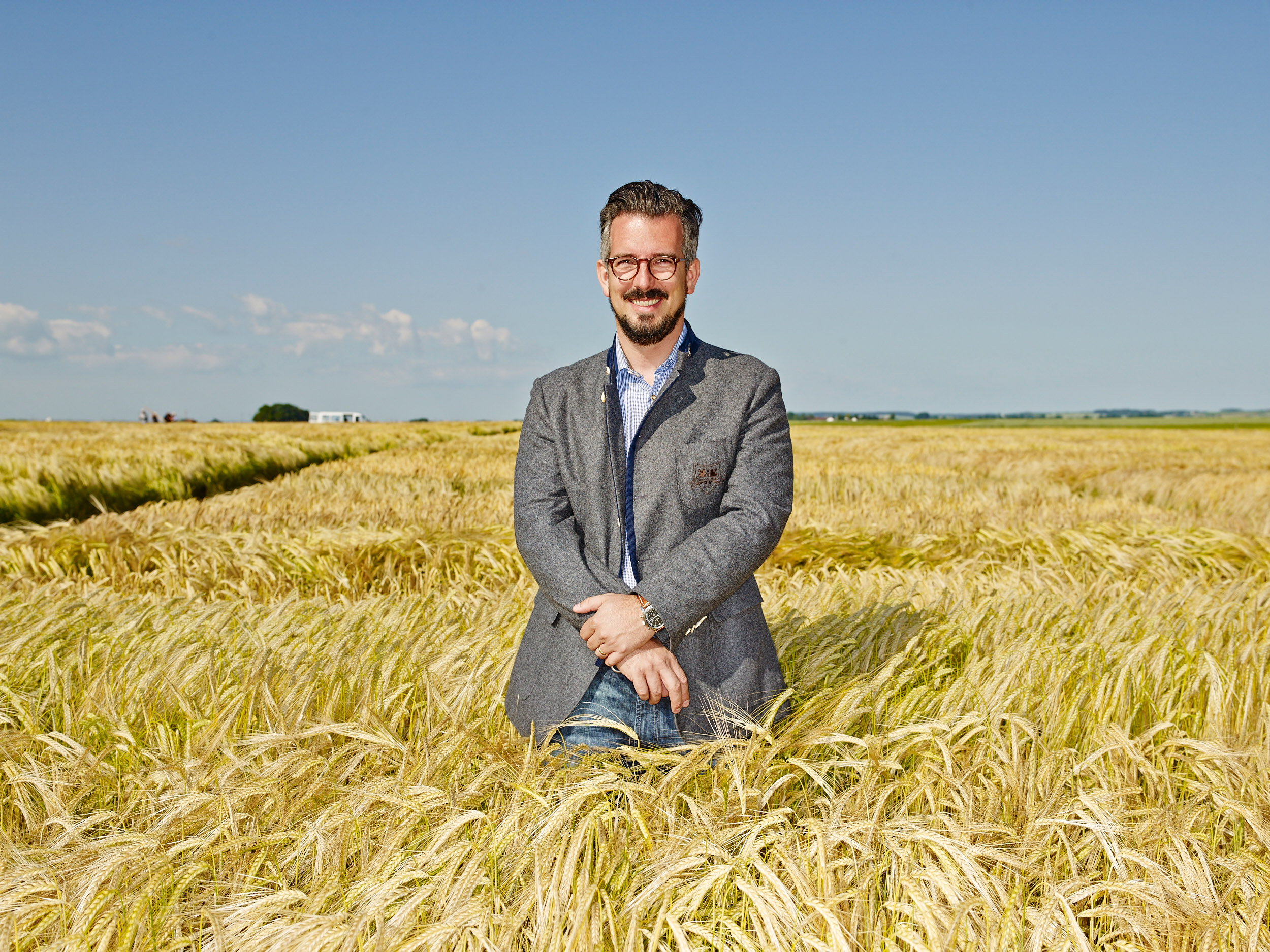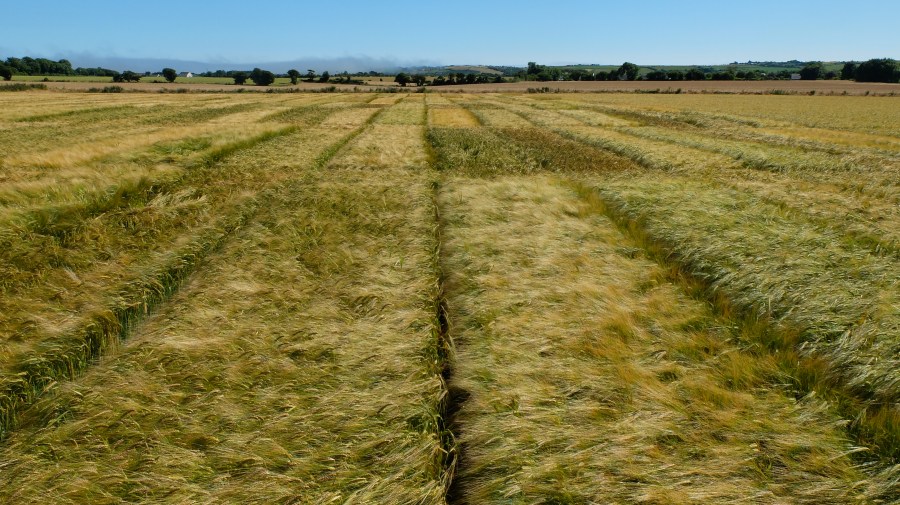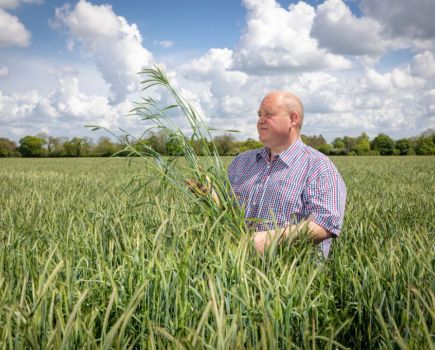If you like your beer to stay fresher for longer, then you’ll like Chanson. If you like your barley to have good yield, strong agronomics and a unique marketing trait, then you’ll love Chanson.
Chanson has that good agronomic package and yield, but the icing on the cake is the null-lox trait.
By Melanie Jenkins
A spring malting barley, Chanson has a treated yield of 102% and an agronomic package that should garner a few pleased nods from farmers. But look at it on the AHDB Recommended List alongside its main and established competitors and growers might be forgiven for asking why they should grow it. Chanson has a secret weapon up its sleeve, however – one that could open doors and markets alike and could result in a tasty premium for those who secure an end-user contract.

Alexander Strube, managing director at Ackermann, is proud to have brought Chanson to the market so quickly.
Chanson’s core appeal lies in it being a null-lox variety, explains Chris Guest at Gleadell. For those who haven’t yet come across the trait, it was developed through a partnership between Carlsberg and Heineken and means that beer stays fresher for longer and won’t lose its flavour over time because the lox enzyme – which causes this – has been bred out of the null-lox lines.
This enzyme causes beer to age, says Dirk Haemke at Saaten Union. “After discovering it, Carlsberg and Heineken got a patent on it and breeders then paid a fee to have access to the material without this particular enzyme. It’s about creating a better beer and of better quality.”
Breeders started developing null-lox varieties 10 years ago, but these varieties suffered minor quality issues or didn’t have the desired yield initially, adds Dirk.
Alexander Strube at Ackermann concurs with Dirk. “At first, when you work with something exotic, you spend a couple of years bringing it into an elite variety that performs well in the field. The first generations often lag in yield or disease resistance.
“The first few varieties created suffered from disadvantages but then we made the cross for Chanson in 2011, several years after receiving the trait and found we had made a high performance cross that also brought in the yield,” explains Alexander.
The right characteristics seem to have unified in Chanson, says Dirk. “It’s the first variety that brings together quality and yield like a normal spring barley but with the null-lox trait. Its yield is on a level with other leading varieties.”
It has a yield similar to that of RGT Planet and Laureate but it might be worth watching the straw content and the specific weight, advises Chris. “Growers don’t want the grain too thick as that could lead to high screenings.”
Though Chanson first came to the UK when it entered the RL as a candidate in 2016 it was bred by German barley breeder, Ackermann and the material has been marketed through Elsoms, says Chris. “It’s the first variety in the UK from Ackermann, and it’s nice to see a new breeder in the field.”
Elsoms might not initially be a company that growers associate with barley, but the development of the null-lox varieties has led to Elsoms and Ackermann setting up a joint venture to expand into the market in the UK.
“The UK has historically been one of the most attractive barley-growing countries for a breeder,” explains Alexander. “It has a nice level of royalties and certified seed. If a breeder is not in the UK, then they are missing out. We used to have maybe one success every 10 to 15 years but in the late 2000s we started putting more lines in trials in the UK,” he explains.
“Three years ago, we decided to step things up a notch,” says Alexander. “We already had a fruitful relationship with Elsoms, and we realised this was a great way for us to set up a joint programme and share each other’s skills. These discussions led to the founding of Elsoms Ackermann Barley.”
Officially founded in Jul 2017, the agreement was signed in Jan 2018 and the company now has two people dedicated to barley development in the UK. “We really are on a path to scale things up further now and the number of lines we have sent to the UK since we started the programme has gone up by 30%.
“We are proud to have been able to bring Chanson up to speed so quickly,” says Alexander. “It was registered for National List in 2015 and was added to the full RL in 2017 and hopefully this year, after going through all the trials, will get full recommendation.”
Though Chanson has been RL approved, it is in the process for approval by the Malting Barley Committee (MBC). “The malting and brewing trials have been done, but it usually requires a few years and batches to get approval,” explains Dirk. “The hope is to get the process finished this year. If it does get approved, it will be the first variety on the RL with the null-lox trait.”
“The development of Chanson was initially hindered by poor harvesting conditions across Europe in the last couple of years which impacting on the multiplication of seed for end user evaluation, says Dirk.
However, following this year’s harvest Chanson has caught the attention of the big brewing groups across Europe, also resulting in the development of huge potential from Australasian markets, says Alexander. “Chanson provides brewers with a real opportunity to develop their processes and it has a very promising future ahead of it.”
Chanson came about after RGT Planet and Laureate and its development has not been as quick, Chris points out. “Because it’s been sat behind these two varieties, it’s been over shadowed, so we’re getting end users to buy into it.”
The benefits of growing Chanson in the UK will really be down to end user acceptance though, adds Chris. “We may see how it does in the next six months or so. But if farmers are going to grow it for malting, they will want it to be linked to a contract, as this gives the security for end market acceptance.”
The null-lox trait puts Chanson at the top for marketing and will mean it’s of interest to farmers when looking at this combined with its agronomy, explains Dirk.
But with domestic markets awaiting MBC approval, what are the possibilities further afield? “Chanson has a big potential for export to the rest of the world and not just Europe,” says Alexander. It’s a brewing only variety, which means that the UK potential is there, but with export, this can be leveraged much further. We’re talking to maltsters all over the world to get interest in the null-lox trait,” he explains. “Asia is showing a lot of interest, so things are very promising.”
Boortmalt, one of the UK’s biggest consumers of malting barley and now the world’s largest maltsters, saw Chanson in trials last year and has done a lot of work with null-lox varieties while Carlsberg was developing the trait. “It’s a very interesting trait as it aligns with specific customers,” says Koshir Kassie at Boortmalt.
However, one drawback has been Carslberg moving away from using 100% null-lox varieties. “There have been some questions as to why they have done so, but this is because, after getting the new variety established, they took a step back to try other things.”
At its peak, Boortmalt was taking 23,000t of null-lox varieties, but this has since fallen. “Once Chanson has been approved, we expect to see more of it again,” says Koshir. “It was just for Carlsberg, but once it’s approved, the door will be open for it to go in a number of different directions. The challenge will be getting it approved and then marketing it. But it is offering something that no other variety is offering.”
Though there’s seed availability in the UK from the 2018 harvest, the wet spring and hot summer impacted heavily on yields from seed crops across the country, says Chris. “We have seed availability for this spring – around 300t, which is a nice tonnage to get it started in England.”
So, with Chanson spearheading a new wave of barleys with a targeted end market, what’s next from Elsoms Ackermann Barley? Two new dual purpose varieties – Firefoxx and Barbarella – passed two years of testing in the UK in 2017 and 2018, according to Dirk. “Firefoxx performed very well in yield testing and Barbarella still has the possibility of being approved for malting, distilling and brewing.”
The company is also developing a winter barley segment with two-row varieties starting to be trialled and six-row varieties for feed and malting, says Alexander. However, he admits that the UK has its own challenges, not just with distiller requirements, but lodging tolerance and disease resistance.
“With any variety we want to give well rounded packages to UK farmers that brew good beer and make excellent whisky,” he adds. “Chanson has that good agronomic package and yield, but the icing on the cake is the null-lox trait and contracts with merchants who will be looking for this will mean a few extra pounds in the pockets of farmers. I would expect there to be a premium for this kind of variety.”





